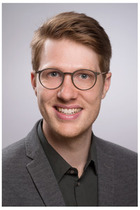Contact
Visiting Address: Historisches Seminar der LMU, Schellingstraße 12, 80799 München, Raum K304.
Room:
304
Phone:
+49 (0) 89 / 2180-5335
Email:
Christoffer.Leber@lrz.uni-muenchen.de
Work group
Former Member of the International Research Group (IGK) - Religious Cultures in 19th and 20th Century Europe
PhD project (completed): Crossing Boundaries. Religion and Secularity in the Monist Movement around 1900
My PhD project looked at the Monism movement in Wilhelmine Germany in order to investigate religious-secular interplay. In January 1906, Ernst Haeckel (1834-1919), then zoologist at Jena, founded the German Monist League (DMB, Deutscher Monistenbund), which in later years came to be the main representative of bourgeois German Free Thinking. The Monist League´s main goal was to develop and spread a comprehensive world view based on natural science. They consciously used their scientific world view to distance themselves from Christian dualism, which differentiated between body and soul, this world and the afterworld. Instead, they claimed to be able to grasp the world by scientific means in its entirety. Monists and their Free Thinking allies tried to combat the predominance of church and conservatism in the Empire and replace them with secular alternatives.
This dissertation´s main figure was the Chemist from Leipzig and Nobel Prize laureate Wilhelm Ostwald (1853-1932), who was chairman of the DMB from 1910-1915. Ostwald developed his own version of Monism, based on thermodynamic principles like entropy and conservation of energy: Energetics.
It has been argued that Monists used (popular) scientific theories and paradigms in order to legitimate their ideas of and demands for secularism: The natural scientific theories popularized by Monists (e.g. evolutionary theory) were the means to question religious authority and justify requests for secularization. These requests included the separation of church and state as well as the development of new approaches to education, gender roles, norms regarding sexuality, and death. Radical feminists like Helene Stöcker fought alongside the Monist League for a new understanding of marriage and for the protection of single mothers; at the same time, Monists and members of the Ethical Movement pushed for a secular teaching of morals at schools.
This project lets us view Wilhelmine Germany in a new light: Far from being merely a militaristic society filled with submissive subjects, Monists and other Free Thinkers anticipated many of the demands debated and fought for in the 20th century: Bodily self-determination, freedom of thought and religion, secularization of schools and the acceptance of cremation.
Further Information
Foci of Research
Science and Religion around 1900; the Monism-Movement and Free Thinkers in Wilhelmine Germany
Awards
- Award for best MA thesis 2014 by the Munich Center for Teacher Training (Münchner Zentrum für Lehrerbildung, LMU).
- Wilhelm Ostwald Award 2019.
- Short Term Fellowship of the German Historical Institute Washington D.C., 2020.

